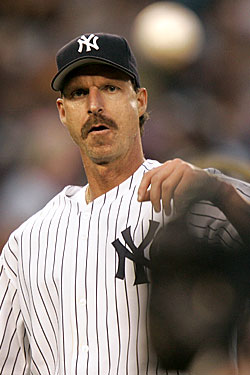
Five years from now, Randy Johnson will be inducted into the Hall of Fame on the first ballot. Johnson, who retired last night, boasts credentials as impressive as anyone’s from his generation: five Cy Young awards, 303 wins, 4,875 strikeouts, a perfect game, a World Series MVP, and so on. And when he enters Cooperstown — probably with a Diamondbacks cap on — the fifth line on his plaque will read “New York A.L. 2005–2006.” That’s the line we’re concerned with here.
We’re guessing when Johnson looks back on the aspects of his career he’s most fond of, his two years in the Bronx will fall somewhere in between killing that bird in spring training and appearing in the 1994 boy-manages-the-Twins film Little Big League. His numbers in New York weren’t altogether terrible — his 2005 season, in particular, when he went 17–8 with a 3.79 ERA and 211 strikeouts, was actually pretty good — but numbers, of course, don’t tell the whole story. There was the time he had words with a CBS cameraman on a city street. And the time his “love child” found her way onto the front page of the tabloids. These things tend not to happen in Phoenix.
But Yankees fans would have been more than willing to overlook those things if Johnson brought them a World Series. He did not, nor did he come close. In their first two postseasons after the collapse against Boston, the Yankees didn’t get past the first round, and Johnson didn’t win a single postseason game. (His best outing was in relief of Mike Mussina in a do-or-die game five in 2005 — he threw four-and-a-third scoreless innings — but it was too little, too late.) Johnson had caused the Yankees much postseason trouble with Seattle and Arizona, but he was clearly past his prime.
And that was really Johnson’s greatest sin: being past his prime. A year before the Yankees acquired Johnson, the Red Sox traded for Curt Schilling, the Big Unit’s partner in crime in Arizona, and won a World Series in his first season. You could argue that was the last year of Schilling’s prime, and that Boston got him just in time. The comparison might be unfair — especially because Johnson’s overall career dwarfs Schilling’s — but it’s inevitable. And there’s no denying that the Yankees got Johnson just a couple of years too late. Those couple of years make all the difference.